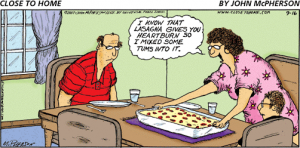 I am willing to bet just about every one of you reading this has at least a passing familiarity with Tums, Rolaids or Maalox or been tickled pink by Pepto Bismol – some of you may even consider these antacids great friends. After all, global antacid sales are well over $10 billion annually so that’s a lot of people buying them. But I’m here to tell you, at the risk of Big Pharma taking a contract out on me, that the uncomfortable burning sensation you feel after a big meal is more often caused by low stomach acid than by too much and, by taking antacids regularly, you are likely making the situation worse.
I am willing to bet just about every one of you reading this has at least a passing familiarity with Tums, Rolaids or Maalox or been tickled pink by Pepto Bismol – some of you may even consider these antacids great friends. After all, global antacid sales are well over $10 billion annually so that’s a lot of people buying them. But I’m here to tell you, at the risk of Big Pharma taking a contract out on me, that the uncomfortable burning sensation you feel after a big meal is more often caused by low stomach acid than by too much and, by taking antacids regularly, you are likely making the situation worse.
Stomach acid is your friend – you need it to digest your food properly. It has several key roles, namely:
- it kills bacteria, viruses and parasites to help prevent food poisoning and other infections (including the bacteria H. pylori, which can lead to ulcer formation),
- it begins protein digestion by helping to unfold proteins and activating pepsin, the protein digesting enzyme in the stomach,
- it cleaves minerals from foods to help your body better absorb them and is also needed for proper absorption of many vitamins, especially B12, which is important for energy and cognitive function and
- it brings the stomach contents to the level of acidity required to signal the pancreas to release enzymes which complete digestion of food in the small intestine.
But how, you ask, can having not enough stomach acid feel like too much? It is simple, when stomach acid is too low, digestion in the stomach does not progress well. As a result, food sits in the stomach longer than it should and begins to ferment and putrefy. And this causes gas…which leads to belching and burping. And when you belch to release gas some of the stomach contents can gurgle up and escape into the esophagus (known as esophageal reflux). This causes the burning sensation as the esophagus doesn’t have the same thick lining of mucous protecting it that the stomach has so any amount of acidity here would prove extremely uncomfortable (and the pH of stomach acid is about the same as battery acid…ouch).
So when you take an antacid it makes you feel better because it neutralizes the acid in the esophagus. But it also neutralizes the acid in the stomach which makes the root cause of the issue worse. That’s why, once you start taking antacids, you may find it hard to stop and you find yourself in a vicious cycle of low stomach acid and poor digestion.
And the consequences of this can be dire, including increased bacterial overgrowth in the gut, ulcers, poor absorption of nutrients from food, greater risk of infection and diseases such as irritable bowel syndrom (IBS), ulcerative colitis, anemia, osteoporosis, cardiovascular disease, stomach cancer, depression, anxiety, insomnia, autoimmune conditions and more.
Heartburn is more common as we age because research has shown that stomach acid levels generally decline with age. By the time we reach 50, in fact, we are making about half the amount we made in our teens.
So, if you are experiencing heartburn, don’t fall into the antacid trap. A simple remedy you can try at home is to drink 1 tablespoon of raw, organic apple cider vinegar or freshly squeezed lemon juice mixed with an ounce of water about 10 to 20 minutes before eating. This helps to raise the acidity of your stomach at meal times so that digestion can progress normally. And remember to relax before eating as stress reduces stomach acid production.
If these steps aren’t sufficient, speak to your health care practitioner about other ways to increase your stomach acid because stomach acid is your friend and essential to good health!